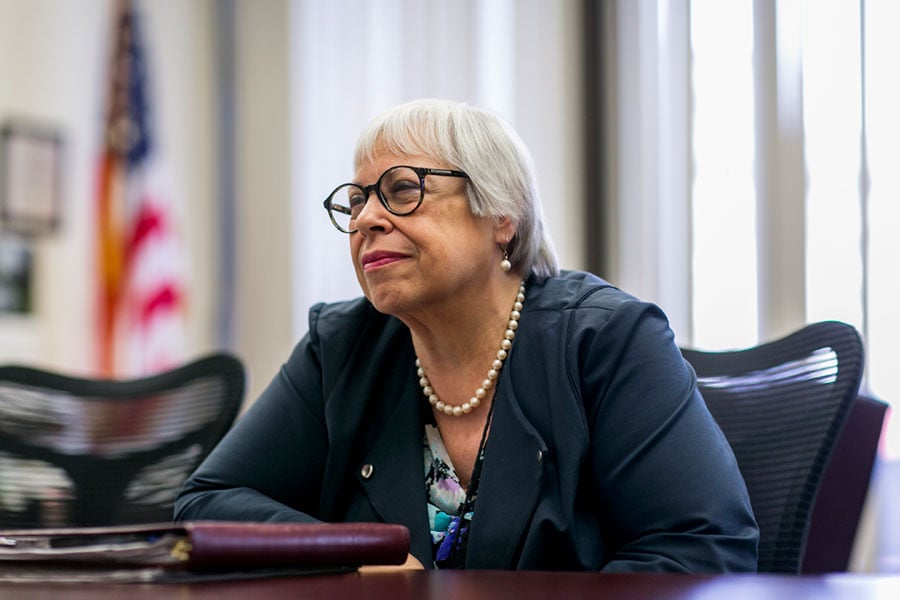

Phyllis Borzi, the architect of a now-defunct Labor Department investment advice rule, challenged the Securities and Exchange Commission to use its new broker advice standard to target conflicts of interest related to payments from fund companies to financial advisers.
The measure Borzi was instrumental in formulating, known as the DOL fiduciary rule, was designed to reduce conflicts of interest for brokers working with retirement accounts. It was vacated by a federal appeals court in 2018. At that point, the SEC started to develop what has become Regulation Best Interest for brokers.
Before its demise, the DOL regulation catalyzed the creation of fund shares that didn’t include so-called 12b-1 fees, which are part of the fund’s expense ratio. But even so-called clean shares can pose conflicts involving revenue sharing, Borzi said.
Revenue sharing involves payments from funds to brokerage firms that aren’t directly reflected in the fees investors pay. They’re often difficult to detect, such as payment for “shelf space” on a brokerage platform. That revenue could influence a recommendation to buy a particular fund.
Borzi, who is a skeptic when it comes to Reg BI, said that in order for the regulation to be effective, it must tackle revenue sharing. The deadline for Reg BI implementation is June 30.
“If it’s really serious about enforcing the new rule, the SEC needs to quickly and seriously ramp up its efforts to understand and regulate these conflicted revenue-sharing payments,” Borzi said on a Wednesday webinar hosted by the Institute for the Fiduciary Standard. “Without seriously focusing on these newly emerging sources of conflict, the SEC will never be able to make any headway in protecting investors in a post-Reg BI world.”
During her remarks, Borzi highlighted a November report issued by Morningstar Inc., “Regulation Best Interest Meets Opaque Practices.”
Aron Szapiro, director of policy research at Morningstar and co-author of the paper, said he hasn’t seen any evidence that Reg BI is curbing revenue-sharing practices or leading to more disclosure of those practices. The level of the conflict depends on the size of the payment and how they vary between providers.
“It appears, so far, most of the mitigation is at the representative level, not the firm level,” Szapiro wrote in an email. “This is potentially particularly problematic for dual-registrants where firm-wide conflicts can affect both [brokerage and advisory] business models.”
Over the last two years, the SEC has been cracking down on inadequate disclosure of 12b-1 fees through its share class selection initiative. That effort has focused on problems the SEC has found on the use of funds with 12b-1 fees in advisory accounts. The targets of the sweep were mostly registered as both brokerages and advisory firms.
Jim Lundy, a partner at Faegre Drinker Biddle & Reath, said he has noticed increased SEC scrutiny of revenue sharing. The SEC probe of 12b-1 fees on the advisory portion of dual registrants’ operations could evolve into a similar examination of those payments or revenue sharing in their brokerage operations after Reg BI goes into force.
“You don’t want to suffer the same fate on the brokerage side of the house post-Reg BI,” Lundy said. “We’re telling our clients to be as explicit as possible about conflicts of interest and the disclosures related to those conflicts.”
In defense of revenue sharing, Lundy argues that the payments aren’t taken directly out of investors’ pockets. It’s money that is exchanged between funds and financial firms.
The SEC’s crackdown on 12b-1 disclosure has drawn fierce resistance from representatives of the brokerage industry, who assert that the agency resorted to “regulation by enforcement” and held firms to a standard that was never articulated through rulemaking. They have expressed concern that the SEC may turn its sights to revenue sharing next.
Borzi is not placing too much hope in Reg BI's addressing hidden broker conflicts. She says the rule is weak because it doesn’t hold brokers to a fiduciary standard and leaves “best interest,” as well as mitigation of conflicts, undefined. The SEC maintains that Reg BI is significantly stronger than the current broker suitability standard.
“While I seriously doubt such a rule can ever be effectively enforced at all, unless the SEC actually focuses like a laser on these potentially different sources of conflicted compensation, not just the traditional ones, the harm to investors will continue and perhaps be exacerbated," Borzi said.

The move to charge data aggregators fees totaling hundreds of millions of dollars threatens to upend business models across the industry.

The latest snapshot report reveals large firms overwhelmingly account for branches and registrants as trend of net exits from FINRA continues.

Siding with the primary contact in a marriage might make sense at first, but having both parties' interests at heart could open a better way forward.

With more than $13 billion in assets, American Portfolios Advisors closed last October.

Robert D. Kendall brings decades of experience, including roles at DWS Americas and a former investment unit within Morgan Stanley, as he steps into a global leadership position.
Orion's Tom Wilson on delivering coordinated, high-touch service in a world where returns alone no longer set you apart.
Barely a decade old, registered index-linked annuities have quickly surged in popularity, thanks to their unique blend of protection and growth potential—an appealing option for investors looking to chart a steadier course through today's choppy market waters, says Myles Lambert, Brighthouse Financial.
